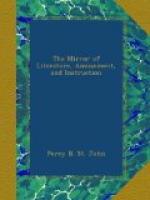Before quitting this subject, it may be observed that the value of a prisoner’s liberty was a regularly transferable property. Coeur de Lion was sold to the emperor Henry; Philip Augustus bargained for him; and his ransom reduced England, from sea to sea, to the utmost distress. Louis XI. bought the bastard of Burgundy from Rene, Duc de Lorrain, for 10,000 crowns, and also William of Chalons, Prince of Orange, for 20,000, from Sieur de Groste. Joan of Arc was sold to the English for 10,000 livres, and a pension of 300. In the case of the Earl of Pembroke, who became the property of Du Guescelin, as part of the purchase-money for some estates in Spain, he had sold to Henry, King of Castile, the constable lost his expected 120,000 livres by the death of his prisoner; as this nobleman was in a bad state of health, his bankers at Bruges wisely declined paying the money until he became sound and in good condition. (Quand il serait sain, et en bon point.) The earl dying before he left France, Du Guescelin lost both his estates and money. One of the family of the Blois was presented to his favourite, the Duke of Ireland, by Richard II., who disposed of his master’s bounty to Oliver de Clisson for 120,000 livres. Zizim, the brother of Bajazet, Emperor of the Turks, after being defeated by his brother in an attempt to seize the throne, fled to the Knights of Rhodes for succour. They, fearing the vengeance of the Sultan, transferred him to Louis XI. who fulfilled his trust faithfully, and kept him for the knights, though offered all the relics that the east abounded with, and even the kingdom of Jerusalem, by Bajazet, for his prisoner. After being given into the custody of the Pope by Louis, and a six years’ residence at Rome, he was sent back to France, as the king had found out that he might be of service in his engagements with Constantinople; he was, however, not restored to his brother in the condition which the Flemings had stipulated the Earl of Pembroke to be restored; for before his redelivery to the French, he is supposed to have been poisoned.
H.
* * * * *




